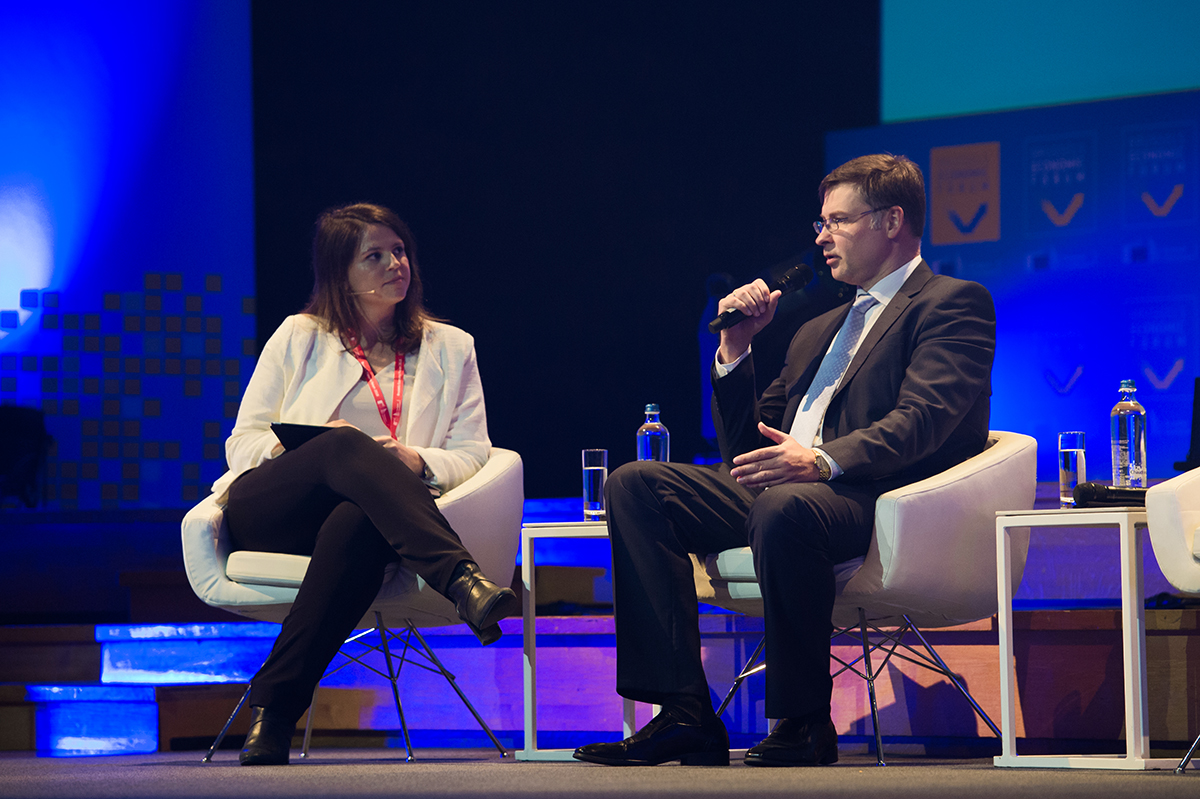Europe is not behind the Valley on technology development, and has better regulation: panel on “What financial system in a digital era”
The second panel of the day started with a one-to-one interview between the moderator, Bloomberg journalist Viktoria Dendrinou, and Valdis Dombrovskis, European Commission Vice-President for the Euro and Social Dialogue, also in charge of Financial Stability, Financial Services and Capital Markets Union. They discussed expectations for EMU reform decisions at the forthcoming European Council before delving deeper into digital issues.
The subsequent panel debate focussed on the impact of digital disruption on the economy and on the EMU’s framework and possible associated strategies.

Q: Vice-President Dombrovskis, I would like to start with a couple of questions on the state of the monetary union. At the end of this month, an important deadline for decisions is coming that has been talked about for months: the European Council Summit. What are your expectations?
VD: We have had intensive discussions for the last couple of years, since the publication of the Five Presidents’ Report on Completing Europe's Economic and Monetary Union (June 2015) and now, indeed, it is time to move from discussions to decisions. Therefore, we see the June summit as a critical milestone. Our leaders have agreed that the short-term priorities should be completion of the banking union, including the banking package on risk reduction, further steps towards risk sharing, and concretely on the backstop for a Single Resolution Fund. Hopefully, there will also be political discussions on a European deposit insurance scheme.
Apart from the banking union, the Commission has put forward a number of legislative proposals which are also going to be discussed, relating to the review and strengthening of the European Stability Mechanism (ESM), potentially becoming a European Monetary Fund.
Most recently, we introduced proposals for new instruments in the context of the new Multiannual Financial Framework (MFF) aimed at strengthening the resilience of the Eurozone. It is an ambitious package worth 25 billion euros and includes the proposal for a European investment stabilisation scheme. In fact, these proposals were discussed at the last editions of the Brussels Economic Forum and I am hopeful that we can make concrete decisions on them soon.
Q: Last weekend, the German Chancellor Angela Merkel clarified her position on EMU reform. What is your reaction?
VD: Obviously, in the run-up to the June summit European leaders are outlining their positions. From what I have understood from her interview, Chancellor Merkel is broadly in line with the Commission. She mentioned incentives for Member States to implement structural reforms and how that can be better supported at EU level. She stressed the importance of investment for economic growth and of strengthening the ESM. She agreed with the Commission on the need to approve the MFF before the European elections next May.
Q: Let’s come to digital disruptors now. How confident are you that the tools you are proposing to deal with them, like the investment stabilisation scheme you mentioned, will be effective?
VD: I think they will be relevant. The main purpose of structural reforms, for example, is to make us more resilient towards future shocks. Important in this respect is to equip the workforce with the skills needed in a changed labour environment. In fact, this will be an increasingly important aspect in our discussions. Connected to this is the question how can we support start-ups and promote innovation. When it comes to start-ups, including FinTech start-up, we can see that they start here and we have good instruments to help them, but when it comes to scaling up, they often leave Europe. That is clearly a missed opportunity for Europe and we are working on a FinTech action plan to give them the environment to stay here.
For the panel discussion, Laurence Boone, Chief Economist, AXA Group, Mariana Mazzucato, Professor in the Economics of Innovation and Public Value at UCL, and Director of the Institute for Innovation and Public Purpose, as well as Kristo Käärmann, co-founder and CEO, TransferWise, joined VP Dombrovskis on the stage.

Asked about what digital disruption could still achieve for the economy, Professor Mazzucato suggested that blockchain technology could be used to bring down economic rents and unlock “hoarded capital”. She pointed out that great technological advances were often made possible by substantial loans or grants from the public sector to private companies – as in the case of Elon Musk, who received $5 billion from the US Government to help develop the Tesla electric car. In turn, the public sector is not always very good at securing returns from future profits of the companies it sponsors, particularly in Europe.
Ms Boone brought up the concept of the “sandbox”, giving innovative companies the opportunity to operate outside the regulatory framework for an experimental phase and under supervision. VP Dombrovskis added that the Commission was considering this model for its FinTech action plan.
Mr Käärman responded by declaring himself “no fan of the sandbox”. “It is being tried out in the UK, Singapore and Japan,” he added, but, to his mind “if rules exist, they do so for good reason. If not, the rules should be changed, not circumvented.” He insisted that, contrary to popular opinion, Europe is not lagging behind the US in terms of technology development, especially in FinTech. “It is perhaps unusual for an entrepreneur to be grateful for regulation, but in the case of the EU, we certainly are.” Referring to crypto currencies, he remarked that the better frameworks are for these new technologies, the easier it will be for entrepreneurs to figure out how to use them. “Keep going, Europe, you are doing a great job,” Käärmann concluded.
